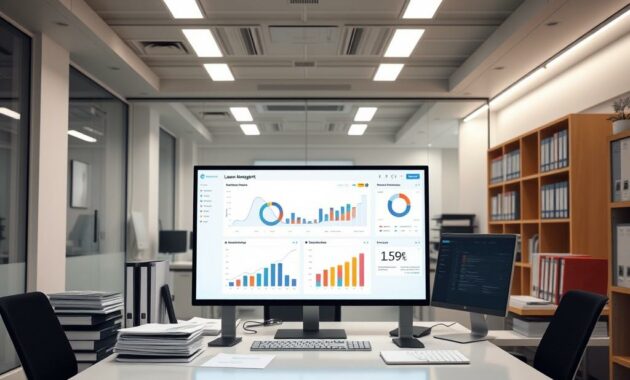In the current business landscape, where speed and precision are paramount, the necessity of efficient lease management cannot be overstated. NetSuite’s lease accounting capabilities offer a holistic solution, addressing the complexities of manual tracking and the compliance hurdles that often accompany them. This platform empowers you to refine your lease management strategies, fostering an environment of transparency and precision in your financial dealings. By integrating NetSuite into your operations, you are not merely optimizing your lease management practices; you are laying the groundwork for long-term success and growth.
Understanding Lease Accounting in NetSuite
The intricacies of lease accounting are paramount for entities engaged in leasing activities. Lease accounting in NetSuite facilitates the management of leasing obligations, ensuring adherence to standards such as IFRS 16 and ASC 842. This discourse elucidates the essence of lease accounting, underscoring its pivotal role in financial reporting and balance sheet management.
What is Lease Accounting?
Lease accounting encompasses the documentation and dissemination of leasing transactions, crucial for delineating a company’s fiscal well-being. Accurate lease accounting enables the adept management of liabilities and assets bound to lease agreements. This discipline is indispensable for both internal monitoring and external regulatory compliance.
Key Features of NetSuite for Lease Management
NetSuite presents several pivotal attributes that augment lease management capabilities:
- Automated Lease Classification: Facilitates the categorization of leases in accordance with current standards, obviating the need for manual intervention.
- Reporting Tools: Provides access to detailed reports on leasing activities, aiding in strategic decision-making.
- Consolidation Capabilities: Consolidates lease data across diverse entities, offering a holistic perspective on lease obligations.
These attributes of NetSuite markedly enhance lease accounting efficacy, ensuring compliance while effectively managing your financial landscape.
Benefits of Using NetSuite for Lease Accounting
Adopting NetSuite for lease accounting introduces pivotal advantages to your entity. It enhances efficiency, compliance, and furnishes invaluable insights, revolutionizing lease management methodologies.
Streamlined Processes
NetSuite’s integration significantly boosts operational efficiency through optimized lease processes. It automates workflows, thereby diminishing manual labor in data entry and reporting. This automation empowers your team to concentrate on strategic endeavors, freeing them from administrative burdens.
Enhanced Compliance
NetSuite guarantees heightened compliance by offering automated updates that mirror the most current financial regulations. Adherence to these standards minimizes the peril of non-compliance, safeguarding your organization from potential penalties and legal repercussions.
Improved Financial Reporting
NetSuite elevates the transparency and utility of financial reporting. It enables the generation of real-time insights into lease obligations and overall lease performance. This capability fortifies decision-making and facilitates the formulation of effective strategic plans for your organization’s future trajectory.
Setting Up Lease Accounting in NetSuite
The establishment of lease accounting within NetSuite necessitates a meticulous configuration process, tailored to the specific requirements of your entity. A well-orchestrated approach ensures the efficient management of leases, thereby fostering a robust framework for their administration.
Initial Configuration Steps
The configuration of NetSuite for lease accounting commences with the delineation of fundamental lease categories and stipulations. Adherence to these initial directives is paramount:
- Identify and categorize lease types based on your organization’s requirements.
- Set lease terms, ensuring compliance with relevant accounting standards.
- Establish user roles to control access to sensitive lease data.
- Tailor settings for reporting and analysis to enhance visibility.
Importing Existing Lease Data
The importation of existing lease data is a critical component of lease accounting setup. It is imperative to verify the accuracy and completeness of your existing lease information. This process is instrumental in facilitating efficient lease management from inception. Adherence to the following steps is essential for successful data import:
- Prepare lease data by ensuring it is organized and formatted correctly.
- Utilize NetSuite’s import tools to load lease data into the system.
- Verify the integrity of the imported data by conducting thorough checks.
- Adjust any discrepancies to ensure consistency across all records.

Adherence to these structured procedures lays the groundwork for effective lease management. The establishment of clear guidelines during the setup phase precludes potential future challenges, thereby maximizing the utility of NetSuite for your organization.
Managing Leases Effectively
The administration of leases within NetSuite necessitates a dual focus: the meticulous tracking of lease payments and the precise scheduling of amortization. These functionalities not only streamline the management of leases but also significantly improve the transparency of your financial reports.
Tracking Lease Payments
NetSuite’s payment tracking capabilities simplify the process of monitoring lease payments. By configuring automated reminders for payment due dates, you can avoid any lapses in payment. Furthermore, the platform’s reporting functionalities provide real-time data on outstanding financial obligations, thereby facilitating more efficient financial management.
Amortization Scheduling
Amortization in lease accounting is crucial for accurately reflecting the financial implications of lease agreements in your financial statements. NetSuite enables the effortless configuration of amortization schedules, ensuring the equitable distribution of expenses throughout the lease term. This approach not only ensures compliance with accounting standards but also significantly enhances financial transparency.
Automation Features in NetSuite
NetSuite’s automation significantly boosts the efficiency of lease management processes. It offers a suite of tools and workflows designed to reduce manual tasks, thereby streamlining operations. This allows for a redirection of focus towards more strategic activities, enhancing overall operational effectiveness.
Workflows for Lease Management
NetSuite’s lease management workflows are meticulously tailored to simplify complex approval processes. The integration of automated alerts for lease renewals and payment reminders is a hallmark of NetSuite’s automation. This feature ensures that you remain organized and proactive, significantly reducing the burden of manual tasks. Consequently, it contributes to a more streamlined and efficient lease management environment.
Automated Reporting Capabilities
The automated reporting capabilities in NetSuite grant you real-time insights into lease performance, eliminating the need for manual data compilation. This functionality empowers you to generate comprehensive reports with ease, facilitating swift decision-making. Such capabilities not only enhance transparency but also cultivate a data-driven culture within your organization.
Integrating NetSuite with Other Systems
The integration of NetSuite with other business systems heralds a new era of operational synergy. This synergy is characterized by enhanced data precision, the eradication of data silos, and the facilitation of cross-departmental collaboration. Such integration enables a fluid exchange of information, empowering teams to make decisions grounded in accurate and current data.
Benefits of Integration
- Enhanced Efficiency: Automation of data transfer diminishes manual entry errors and conserves time.
- Real-Time Insights: Access to contemporaneous information fosters superior decision-making.
- Improved Collaboration: Teams spanning different departments can effortlessly share data and insights.
Compatible Systems and Tools
NetSuite seamlessly integrates with a plethora of compatible systems, thereby augmenting its functionalities. Illustrative examples include:
| System | Description |
|---|---|
| CRM Systems | Enhances customer interaction and sales tracking. |
| Accounting Software | Streamlines financial reporting and reconciliations. |
| Project Management Tools | Improves project tracking and resource allocation. |
These integrations underscore NetSuite’s capacity to be seamlessly integrated with your existing infrastructure, thereby maximizing the potential benefits of integration across your organization.
Customizing Your NetSuite Lease Management
The art of optimizing lease management through NetSuite customization is pivotal for business differentiation. This adaptability empowers you to fine-tune the platform to resonate with your unique operational dynamics, ensuring a seamless integration with your organizational workflows.
Tailoring Features to Your Needs
Initiating the customization journey begins with the modification of reporting templates. By crafting custom reports, you unlock insights that are germane to your enterprise, arming decision-makers with actionable data. The adjustment of user interfaces facilitates a more intuitive experience, streamlining navigation and reducing complexity. Furthermore, configuring workflows to align with your specific operational needs significantly boosts productivity.
Incorporating User Feedback
The integration of user feedback is a cornerstone of successful customization. By soliciting insights from those who interact with the system on a daily basis, you can pinpoint areas of friction and potential for enhancement. Implementing these insights into the system not only refines its functionality but also elevates user satisfaction, fostering a culture of continuous improvement within your NetSuite ecosystem.
Common Challenges in Lease Accounting
Lease accounting is fraught with complexities, including intricate regulations, the imperative of data accuracy, and the laborious task of manual data entry. These obstacles necessitate a strategic approach for their resolution, ensuring that organizations remain compliant and maintain operational efficiency.
Strategies to Overcome Obstacles
To surmount the challenges inherent in lease accounting, consider the following strategies:
- Revise Internal Processes: Regularly update and streamline your accounting workflows to enhance efficiency.
- Invest in Training: Provide ongoing training for staff to ensure they are well-versed in lease accounting standards and NetSuite functionalities.
- Utilize Technology: Leverage automation tools within NetSuite to reduce manual entry errors and improve accuracy.
Utilizing NetSuite Support Resources
NetSuite offers invaluable support resources to aid in overcoming lease accounting challenges. Accessible are:
- Help Center Articles: These provide step-by-step guides on various features and common issues.
- Community Forums: Engage with other users to share experiences and solutions, fostering a supportive network.
- Webinars and Training Sessions: Participate in sessions to deepen your understanding of the platform.
Best Practices for Lease Management in NetSuite
To optimize your lease management processes in NetSuite, implementing the best practices in lease management is crucial. Two key areas to focus on include regular data reviews and effective team training, which can significantly enhance your overall efficiency.
Regular Data Review
Engaging in regular reviews of your lease data can lead to better oversight and informed decision-making. Schedule frequent evaluations to examine terms, payment schedules, and compliance. This proactive analysis helps you identify trends, discrepancies, and opportunities for improvement. Establishing a routine can ensure that no critical details slip through the cracks, maintaining accuracy and reliability in your lease management process.
Training Your Team
Investing in team training is instrumental for maximizing the capabilities of NetSuite. Properly trained staff will navigate the system more efficiently, which enhances overall productivity. Develop a curriculum that covers the core functionalities relevant to lease management and offers ongoing education opportunities. Tailoring the training to your team’s specific needs fosters a culture of continuous improvement and strong lease management practices.

Future Trends in Lease Accounting and NetSuite
The evolution of lease accounting is propelled by technological innovations and regulatory updates. As you strive to refine your lease management within NetSuite, understanding these emerging trends is crucial. The advent of artificial intelligence and machine learning in accounting systems promises to revolutionize lease data processing and analysis. These innovations will facilitate more precise automated processes, thereby enhancing data accuracy and offering profound insights into your lease portfolios.
Technology Advancements
The integration of cutting-edge technologies into lease accounting systems, such as NetSuite, will usher in real-time data analytics and bolster decision-making capabilities. Utilizing tools that leverage automation, managing intricate lease agreements and adhering to compliance standards will become significantly less challenging. By embracing these technological advancements, you can optimize your operations, diminish manual errors, and refine your lease management strategies.
Regulations Impacting Lease Accounting
Concurrently, lease accounting regulations are undergoing continuous revisions, influencing business accounting methodologies. It is imperative to remain abreast of these regulatory adjustments to circumvent potential non-compliance issues. By proactively adapting to these lease accounting regulations within NetSuite, your organization can adeptly navigate these shifts, ensuring compliance while maximizing the utility of your technological solutions.



